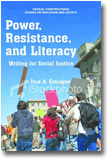
Power, Resistance, and Literacy
Writing for Social Justice
Edited by:
Julie A. Gorlewski, SUNY New Paltz
A volume in the series: Critical Constructions: Studies on Education and Society. Editor(s): Brad J. Porfilio, California State University, Stanislaus. Marc Pruyn, Monash University. Derek R. Ford, DePauw University.
Published 2011
Students in public schools serving poor and working-class students are inundated by the effects of high-stakes examinations. Teachers are demoralized and students suffer substandard curricular and pedagogical experiences. These effects are articulated by students and teachers in the high school that provided the setting for the critical ethnography on which this text is based. Teachers resent being judged on the basis of students’ performance on standardized assessments. They are deprofessionalized as their roles are oriented toward working-class norms. Students feel alienated by content that is meaningless and test-based pedagogies that are disempowering.
While these findings are disturbing, critical theory provides a foundation for seeking hope. By incorporating inquiry and dialogue, this theoretical framework opens a space where resistance can be revealed and examined. In this case, the study exposed glimmers of resistance, spaces in the structure of schooling where students and teachers critique the system and suggest ways of subverting the negative effects of the neoliberal reforms through dialogic, empowering, culturally responsive pedagogies.
Collective resistance, achieved through dialogic pedagogies that build on understandings of resistance and power, can cultivate theoretical and material spaces where a cycle of praxis can enhance possibilities for social justice. To that end, the conclusion is devoted to the implementation of critical, dialogic approaches to literacies, approaches intended to interrupt the hegemonic influences that perpetuate social reproduction by capitalizing on the potential for solidarity and collective agency among the students and teachers who populate and educate the working classes. This book would interest teacher educators, teachers, and school administrators.
CONTENTS
Acknowledgments. Foreword, Ira Shor. Preface. PART I: POWER.
1. Introduction: From Neoliberalism to Dialogicality. 2. The Study. 3. Social
Class, Writing Instruction and Identity Construction. 4. High-Stakes Testing:
Social And Emotional Effects. 5. Restricted Literacies. PART II: RESISTANCE. 6.
Teaching or Selling Out? 7. Writing Instruction: What “Is” and What “Ought To
Be”. 8. Hints at Hope, Glimmers of Resistance. 9. Resistance Literacy: Two Approaches.
10. Looking Forward: Empowerment, S Social Justice, and Collective Agency. About
the Author.
REVIEWS
"Gorlewski (SUNY, New Paltz) has written an important book that focuses on literacy among working-class high-school students and the ways hegemonic practices and policies reproduce power relations in contemporary society. Employing a critical ethnographic approach, the author spent more than one academic year examining the academic writing of students, talking and working with their teachers, and interacting with school administrators and others in a high school serving urban working-class students. Her major findings focus on issues related to the construction of class identity, the insidious role of high-stakes testing in the production of written work, and the accompanying narrowing of the high-school writing curriculum. The final section of the book provides interesting and thought-provoking glimpses into how teachers attempt to resist hegemonic practices and the structures of the hidden curriculum to promote a critical literacy. Among these approaches are pedagogies designed to increase student agency, efforts to improve student understanding of the social constructions of texts, and techniques to promote student voices and choices. Many books have examined school practices through the lens of critical theory, but few have provided the guidance and hope this one does. Summing Up: Highly recommended. Upper-division undergraduates and above." S. H. Minner Radford University in CHOICE
-
Paperback978-1-61735-405-2
Web price: $45.04 (Reg. 52.99)
-
Hardcover978-1-61735-406-9
Web price: $80.74 (Reg. 94.99)
- eBook9781617354076

- EDU037000 - EDUCATION: Research
- LAN015000 - LANGUAGE ARTS & DISCIPLINES: Rhetoric
- LAN010000 - LANGUAGE ARTS & DISCIPLINES: Literacy
-
 DIY Punk as Education
From Mis‐education to Educative Healing
DIY Punk as Education
From Mis‐education to Educative Healing
-
 Imagining Education
Beyond the Logic Of Global Neoliberal Capitalism
Imagining Education
Beyond the Logic Of Global Neoliberal Capitalism
-
 Multiculturalism, Dialectical Thought, and Social Justice Pedagogy
A Study from the Borderlands
Multiculturalism, Dialectical Thought, and Social Justice Pedagogy
A Study from the Borderlands
-
 Read Aloud Handbook for Native American Children
Read Aloud Handbook for Native American Children
-
 Rethinking Social Studies
Critical Pedagogy in Pursuit of Dangerous Citizenship
Rethinking Social Studies
Critical Pedagogy in Pursuit of Dangerous Citizenship
-
 The 2017 Hampton Reader
Selected Essays from a Working-class Think Tank
The 2017 Hampton Reader
Selected Essays from a Working-class Think Tank
-
 The Luso-Anarchist Reader
The Origins of Anarchism in Portugal and Brazil
The Luso-Anarchist Reader
The Origins of Anarchism in Portugal and Brazil

